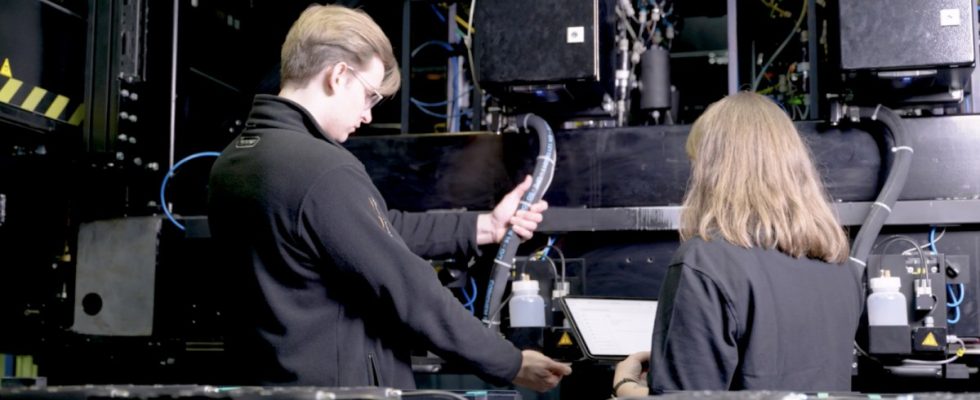Strange noises are coming from the system in the factory hall, and a sensor is also measuring elevated temperatures. The long-serving machine operator knows what the problem is – and what needs to be done. A German start-up wants to leverage this wealth of experience and make it usable in the form of easy-to-use software. The program helps customers diagnose and correct errors. To do this, it analyzes the data that sensors send from the machines with artificial intelligence – and with the knowledge fed into it by the factory workers. “A few hours of interview with a veteran machine operator provides us with quicker insights than analyzing a year and a half of machine data,” says Sina Kämmerling.
The 29-year-old is co-founder and boss of the company Findiq. It now has seven employees and 15 customers, such as Phoenix Contact, a global market leader for electronic components. Findiq’s sales are expected to cover costs for the first time in a year, although Kämmerling only founded the start-up in spring 2022. And the former management consultant did not choose a startup stronghold like Berlin, Munich or Hamburg as the location, but rather the tranquil Herford in East Westphalia, a region in the northeast of North Rhine-Westphalia. “There are many medium-sized industrial companies here, many mechanical engineers: We are close to potential customers,” says Kämmerling.
In addition to Findiq, a good 50 other start-ups were founded in East Westphalia-Lippe in 2022, a record. This comes from the annual Investigation by the Federal Association of German Startups out. And this despite the fact that the number of start-ups in Germany fell overall. Accordingly, the start-up centers of Berlin, Munich and Hamburg are slowly losing a little of their dominance. While they represented 41 percent of all start-ups in 2019, they now only account for 33 percent.
The low rent helps the founders
Vanessa Hünnemeyer also deals with start-up events in Germany. The economic geographer is a consultant at IW Consult, a subsidiary of the German Economic Institute in Cologne. Hünnemeyer says that large cities are still a magnet for founders, for example because of the universities or the proximity to other young companies and investors. But there are also regions with numerous start-ups in the rural areas surrounding the cities: “Here you can quickly get to the cities with their advantages, but you can perhaps benefit from cheaper rents and from the proximity to industrial customers who are based there.” For example, in East Westphalia-Lippe there are many innovative industrial companies outside of the largest city, Bielefeld – and that could explain why numerous start-ups are settling there, says Hünnemeyer.
Founder Kämmerling also mentions the rent level as an advantage of Herford. On the other hand, it is certainly easier to find skilled workers in a metropolis like Berlin. “But nowadays a lot of things are done remotely; we can work with people who don’t even have their desks with us in Herford,” she says. The disadvantage is that the start-up scene is smaller and you meet fewer other founders.
Findiq founder Sina Kämmerling benefited from a funding program.
(Photo: Findiq)
However, Kämmerling took part in a program run by the Bielefeld Founders Foundation, an organization that supports start-ups, for example with seminars, conferences or office space. “It brings a little bit of Berlin to Bielefeld,” she says with a laugh. She also met later customers through the Founders Foundation, which was set up by the Bertelsmann Foundation in 2016; She was also able to exchange ideas with other founders there.
IW researcher Hünnemeyer says such initiatives, which strengthen networking among founders and offer suitable work spaces, are extremely important so that rural regions can reduce disadvantages compared to metropolises like Berlin. The head of the Founders Foundation is Dominik Gross. “When we started, this was a startup desert with only four startups,” he says. There are now a good 180 start-ups in East Westphalia-Lippe.
The young companies help the industry
The vast majority of the young companies are not targeting their products at consumers, but rather at industrial customers – just like Findiq, says Gross. After all, East Westphalia-Lippe is home to large companies such as Miele, Melitta and the Oetker Group, the agricultural machinery manufacturer Claas and the electronics specialists Wago and Phoenix Contact. “This is reflected in the start-ups,” he says. “They can offer the industry innovative solutions to become more efficient.”
Business is now going so well at Findiq that founder Kämmerling wants to set up a second location. Not in Berlin, not in Hamburg or Munich – but in Baden-Württemberg: “There is also a lot of medium-sized industry there, like here.”

